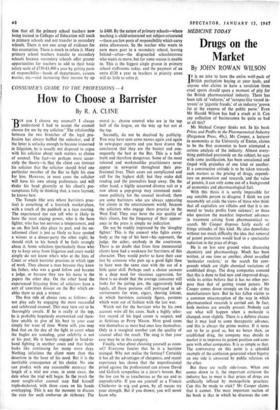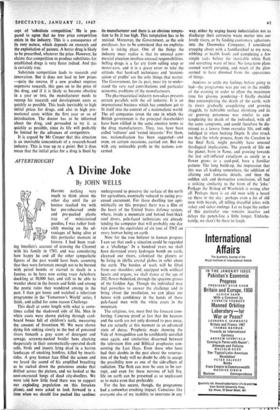Drugs on the Market
By JOHN ROWAN WILSON
Tr is no joke to have the entire wolf-pack of 'British puritanism baying at your heels, and
anyone who claims to have a revulsion from anyone who claims to have a revulsion from cruel sports should spare a moment of pity for the British pharmaceutical industry. There has been talk of 'vultures,' of 'octopus-like vested in- terests' or 'gigantic frauds,' of an industry 'grown fat at the expense of the public purse.' Even Mr Harold Wilson has had a crack at it. Can any collection of businessmen be quite so bad as all this?
Mr Michael Cooper thinks not. In his book Prices and Profits in the Pharmaceutical Industry (Pergamon Press, 40s.), Mr Cooper, a lecturer in economics at the University of Exeter, claims to be the first economist to have attempted a serious analysis of the industry. Almost every- thing published previously on the subject, he says with some justification, has been sensational and tinged with prejudice of one kind or another.
If a constructive attitude is to be taken towards such matters as the pricing of drugs, expendi- ture on promotion and research, and the value of patents, it can only come out of a background of economics and pharmacological fact.
With this thesis it is surely impossible for any sensible person to disagree. I think we can reasonably set aside the views of those who think that all capitalists are villains and that it is im- moral to 'make profits from sickness'; or those who question the manifest important advances in treatment arising from pharmaceutical re- search. Mr Cooper disposes fairly easily of fringe attitudes of this kind. He also demolishes without too much difficulty the idea that removal of patent protection would lead to a spectacular reduction in the price of drugs.
He is on less sure ground when discussing chemistry and pharmacology. Much has been written, at one time or another, about so-called 'molecular roulette,' or the search for com- pounds which are slight chemical variations of established drugs. The drug companies contend that this is dons to find new and improved drugs, while its critics believe that it has no other pur- pose than that of getting round patents. Mr Cooper comes down strongly on the side of the manufacturers here. But he has fallen victim to a common misconception of the way in which pharmaceutical research is carried out. In fact, both motives are usually present. Nobody can say what will happen when a molecule is
changed, even slightly. There is a definite chance that it may lead to some therapeutic advance,
and this is always the prime motive. If it turns out to be as good as, but no better than, an established drug, the company may decide to market it to improve its patent position and com- pete with other companies. It is as simple as that. The controversy on this point is a splendid example of the confusion generated when bigotry on one side is answered by public relations on the other.
But these are really side-issues. When one comes down to it, the important criticism the industry has to meet is that prices of drugs are artificially inflated by monopolistic practices. Can this be made to stick? Mr Cooper claims that it cannot. The most important section of his book is that in which he discusses the con-
cept of 'substitute competition.' He is pre- pared to agree that no true price competition exists in the industry. This is a consequence of its very nature, which depends on research and the exploitation of patents. A better drug is likely to be prescribed, whatever the price. However, he claims that competition to produce substitutes for established, drugs is very fierce indeed. And this is certainly true.
Substitute competition leads to research and innovation. But it does not lead to low prices —quite the reverse. If a new product requires expensive research, this goes on to the price the drug, and if it is likely to become obsolete in a year or two, the manufacturer needs to recoup his research and development costs as quickly as possible. This leads inevitably to high initial prices for drugs, and also to high pro- motional costs within the first year or so of introduction. The doctor has to be informed about the drug, and persuaded to try it. as quickly as possible, since its life will probably be limited by the advances of competitors.
It is argued by Mr Cooper that this situation is an inevitable concomitant of a research-based industry. This is true up to a point. But it does mean that the initial price for a drug is fixed by its manufacturer and there is an obvious tempta- tion to fix it too high. This temptation has to be resisted. Moreover, the Government, as the sole purchaser, has to be convinced that no exploita- tion is taking place. One of the things the industry must realise is that its unusual com- mercial situation involves unusual responsibilities. Selling drugs is a far cry from selling soap or motor-cars, and it is a grave error to take the attitude that hard-sell techniques and `maximi- sation of profits' are the only things that matter. The Government, for its part, must try to under- stand the very real contributions and particular economic problems of the manufacturers.
The pharmaceutical industry nowadays presents certain parallels with the oil industry. It is an international business which has somehow got to fit itself into the context of a nationalistic world. The oil companies (even the one in which the British government is the principal shareholder) have been vilified in the same emotive terms as the drug manufacturers. They, too, have been called `vultures' and `vested interests.' For them, too, nationalisation has been suggested—and even, on certain occasions, carried out. But not with any noticeable profit to the nations con- cerned.































 Previous page
Previous page